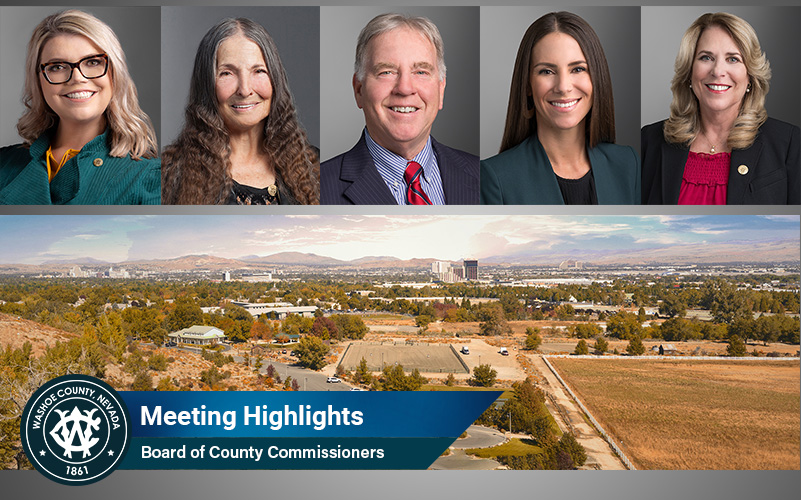The following are highlights from today’s Washoe County Board of County Commissioners meeting:
1. Board adopts amendments to Tahoe Area Plan: The Board of County Commissioners voted to approve code amendments to the Tahoe Area Plan, which was adopted in 2021 and serves as a Master Plan for the Incline Village area. In 2023, the Tahoe Regional Planning Agency (TRPA) adopted Phase 2 Housing Amendments to support deed-restricted affordable, moderate, and achievable multi-family developments. The number of units that can be built is not changed; these amendments address the type of units that can be built to address the lack of affordable housing in the Tahoe basin.
The code amendments approved today are mandated by TRPA, and TRPA has given Washoe County additional time past its deadline – December 2024 – to finesse the amendments to address residents’ concerns, particularly parking and density. Senior Planner Kat Oakley told the Board of County Commissioners that if Washoe County did not approve the amendments, TRPA has the latitude to adopt them without Washoe County’s refinements. This was echoed by Deputy District Attorney Michael Large: “From a legal standpoint, these are TRPA-mandated amendments. TRPA’s housing amendments preempt local regulatory authority. We don’t have a choice. Whether we vote no or yes on this item today, the housing amendments will go into effect.”
Large further clarified that the way TRPA is structured, it has the jurisdiction to pass its own ordinances that are binding on Washoe County, and its housing amendments will go into effect regardless of the Board’s decision.
Assistant County Manager Dave Solaro addressed concerns from public commenters about fire danger and the limited number of highway routes in and out of the Tahoe basin.
“On February 25, 2025, we accepted a donation to create an evacuation study to identify the most vulnerable locations in our community, whether it’s Incline Village or Caughlin Ranch or the City of Reno,” Solaro said. “We have heard from public comment today that there is a lack of locations in and out. That can be said for a lot of locations in Washoe County. If you look at Cold Springs, there are two ways in and out, one less than the Incline Village area has. But when you look at the fuel loading and mitigation and all those things that go into it, that’s really what we’re studying to identify those vulnerable locations within Washoe County to create the plan to make sure that we are doing what we need to do.”
2. County Assessor provides State of Office and discussion of property tax dynamics: Washoe County Assessor Chris Sarman appeared before the Board to provide an overview of the essential service his office provides in assessing value to fairly, uniformly, and efficiently generate property tax revenue. The Assessor’s Office was created in 1861, the same year that Washoe County was created, and currently generates 52 percent of the General Fund revenue for the county.
Sarman highlighted that his office produces and manages more than $95.7 billion in taxable value across 192,380 parcels, in turn, this stems tax billings of approximately $811 million in property taxes. This is all done with a staff of 63 and at a cost of $9.5 million, which equals $49/parcel.
“I think a lot of folks don’t realize what is taking place in your department,” Commissioner Mike Clark, who served as Assessor for eight years. “We have seven elected positions in the county, and you can go through life without having any interaction with many of them, but everybody in this county has some interaction with the Assessor’s Office. You’re here to discover, make a list of, and value all property that’s subject to taxation.”
3. Budget manager presents year-end budget report: Budget Manager Lori Cooke noted that sales tax revenue distributions are down across the state, not just locally for the county. Taxable sales are up, but distributions from the State of Nevada are lagging statewide, so Washoe County has not realized that increase yet.
Comptroller Cathy Hill added that her office is still closing out the FY25 and that the presentation of today’s figures are unaudited, but it appears that the county will be over estimated-budget for personnel and under-budget for services and supplies.
“We knew we were going to be using fund-balance this year as we have been using fund-balance because our expenses cannot keep up with our revenues,” Chair Alexis Hill said. “Please let us know what this Board can do to support your work in bringing together the counties and cities on this issue… I know that the rest of our communities around the state are having the same issues.”
4. Board receives update on status of Virginia Range horses: Nevada Department of Agriculture (NDA) Director J.J. Goicoechea presented information on the Virginia Range horses, the wild horses that live in the Reno area. They are largely the descendants of former ranch horses and are legally considered estray/feral livestock and fall under the jurisdiction of the NDA. Goicoechea shared that in 1997, there were 414 feral horses in the Virginia Range, and in 2022 that number surpassed 3,500.
The horses pose a safety issue as the range is bordered by four major highways and residential areas; in 2024, there were 36 horse vs. vehicle incidents. The NDA is working to repair and construct new fencing to keep the horses in the wildland area and out of streets and neighborhoods, beginning at Jumbo Grade in Washoe Valley and working northward. Goicoechea stated that the deteriorating fence along Eastlake Boulevard, the western boundary of the Virginia Range, will not be replaced, as it would create a place for horses to congregate alongside a busy road.
Garth Oksol with J.U.B. consulting followed Goicoechea to provide information on the City of Reno’s Wildlife Protection Project that will reduce wildlife/human interactions while maintaining access to public spaces.
This involves installing cattle guards and fencing while providing access to water sources to draw the horses out of residential areas.
“Fencing is one part of it, birth control is another part of it, and adopting these animals out is another part,” Commissioner Mike Clark said. “Let’s put all these pieces together to get this problem reduced. It’s a big problem for a lot of reasons.”
5. Board appoints member to Open Space and Regional Parks Commission: The Board voted to appoint Jennifer Uvira to a partial term on the Washoe County Open Space and Regional Parks Commission. The commission has nine seats with staggered four-year appointments; this appointment is effective through June 30, 2027.
6. Board approves donations to Regional Parks: The Board approved just over $5,600 in cash donations to various parks programs, including more than $3,600 to support the Lazy 5 Summer Music Series.
7. August recognized as Emergency Management Awareness Month: The County Commissioners presented a proclamation declaring August Emergency Management Awareness Month to Washoe County Emergency Management staff. This is the first time for this recognition, which notes that “Emergency Management professionals work tirelessly to build community resilience, educate the public, and ensure that critical infrastructure and essential services are protected and restored quickly following a disaster.”
8. Board approves District Special Funds: The Board approved a $5,000 grant from District 2 Special Fund to Mustangs of America Foundation. The grant will support the Bureau of Land Management with the Northern Nevada Correctional Center’s wild horse training program.
###


